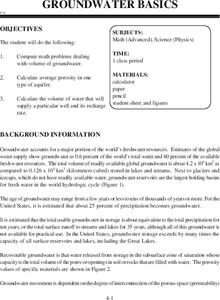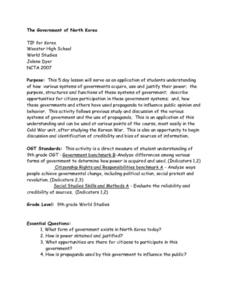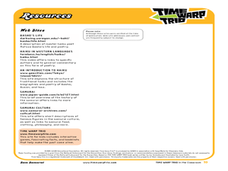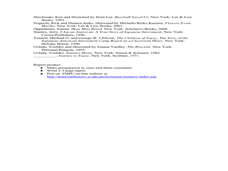Curated OER
Groundwater Basics
Groundwater is an essential natural resource, not to mention a fascinating topic to study. Here is a series of twelve amazing lessons on the water source and how we use it in our daily lives. Concepts require higher math and physics...
Curated OER
Answering Carnival Questions with the Scientific Method
Through the use of a Reading Rainbow episode, clever in-class games and activities, and an ITV Series video, second and third graders engage in a study of the scientific method; what it is, and how scientists use it. This well-designed...
Constitutional Rights Foundation
History of Immigration Through the 1850s
Everyone living in the United States today is a descendant from an immigrant—even Native Americans. Learn about the tumultuous history of American immigration with a reading passage that discusses the ancient migration over the Bering...
Curated OER
Unlikely Communicators: Carrier Pigeons
Second graders explore information about carrier pigeons and other means of communication. They describe different types of communication and transportation and identify their advantages and disadvantages They develop a Communication...
Curated OER
The Government of North Korea
Ninth graders study the Government of North Korea. They identify the system of government of North Korea today and explain how power is acquired, used and justified by it. They describe the use of propaganda by this government system...
Curated OER
Words In The News Latin American Migrant Money
Students explore the life of a migrant worker. They compare the life of those living in the United States with a poorer country such as Mexico or Latin America. After looking up the definitions of vocabulary words, groups of students...
Curated OER
The Roots of Ahimsa
Students investigate the philosophy of nonviolence. In this Ghandi lesson, students discover that Gandhi inspired many civil rights leaders with the idea of ahimsa. Students complete venn diagrams, create timelines, and discuss reading...
Curated OER
Confucianism
Students examine the beliefs and history of the religion by studying mythology and sayings. They compare the beliefs of Confucian culture to American culture and share their information as class by an informal teacher lead discussion.
Curated OER
Sam Samurai
Learners study the history and culture of 17th century Japan by examining samurai. They review the format of haiku poetry and examine renga poetry. They examine Kamishibai, the Japanese storytelling form and apply it five facts they...
Curated OER
Using Words to Work Things Out
Third graders discuss ways to use words to solve a conflict. In this conflict resolution lesson, 3rd graders read the book Angela and Alice and discuss the conflict from the story. Students brainstorm ways to solve conflicts among...
Curated OER
Literacy Through Photography
Students practice using words to describe photographs they have taken. In this descriptive writing lesson plan, students utilize a disposable or digital camera to take 5 pictures of their life after school. Students create slides from...
Curated OER
Lesson 2: Mapping Our Home
Students recognize the importance of community participation in the census. In this U. S. Census lesson plan, students use map-reading skills to find answers and learn the difference between senators and members of Congress.
Curated OER
Comparisons, Redeeming Slavery, and Code words.
Young scholars compare and contrast parallels between various aspects of slavery. For this anti-slavery lesson students examine types of slavery from the Holocaust to contemporary issues of slavery in the world today.
Curated OER
Assignment Discovery Lesson Plan World War II
High schoolers examine primary and secondary documents about life on the homefront during World War II. In this World War II lesson, students research the conditions of daily life in the United Kingdom, the United States, and Germany...
Curated OER
Using Words to Work Things Out
Students recognize a problem and how to resolve it. In this lesson, students listen to The Hating Book and discuss the events of the story. Students answer comprehension questions and relate to their own experiences. Students role play...
Curated OER
Word Play
High schoolers examine the history of Chinese American artist Xu Bing. In this multicultural activity, students collaborate in small groups to identify letters in the artist's work, and brainstorm how they would create their own images...
Curated OER
Lesson III: Crisis, Pearl Harbor, Internment
The third in a series of lessons introduced by “A Fence Away From Freedom,” uses the Smithsonian website, “A More Perfect Union: Japanese Americans and the U.S. Constitution” and focuses on the section of the presentation devoted to the...
Curated OER
Fair Housing Lesson 4: Constitutional Hearing
Students investigate fair housing issues in the United States. In this government lesson, students watch "No Place Like Home," and then prepare to participate in a classroom simulation that requires them to act as state legislators and...
Curated OER
Up From The Roots
Students review prefixes and root words then complete a Root Words worksheet. An answer sheet is provided with the lesson plan.
Curated OER
Who Am I? - Locomotor Skills
Students discuss the meaning of the word locomotion and the different ways that they use locomotor skills.
Curated OER
East Asian Study Seminar
High schoolers research and experience the culture of Zen Buddhism. They engage the practice of meditation by practicing themselves in a variety of contexts with different cultural readings.
Curated OER
Square Roots
Learners differentiate between perfect roots and rational roots. In this algebra lesson, students perform operation using roots. They add, subtract, multiply and divide rational expressions.
Curated OER
Using Charts and Graphs to Study East Asia's Modern Economy
Students examine East Asia's modern economy. In groups, classmates use the internet to compare the resources, products, and economy of specified countries. After collecting the data, pupils create charts, tables and graphs. They...
Curated OER
Reading Word Recognition, Fluency, and Vocabulary
Eleventh graders analyze words that derive meaning from Greek, Roman, and Norse myths. In this myth vocabulary lesson, 11th graders work in learning groups as visual learners, kinesthetic learners, and artistic learners to identify the...

























